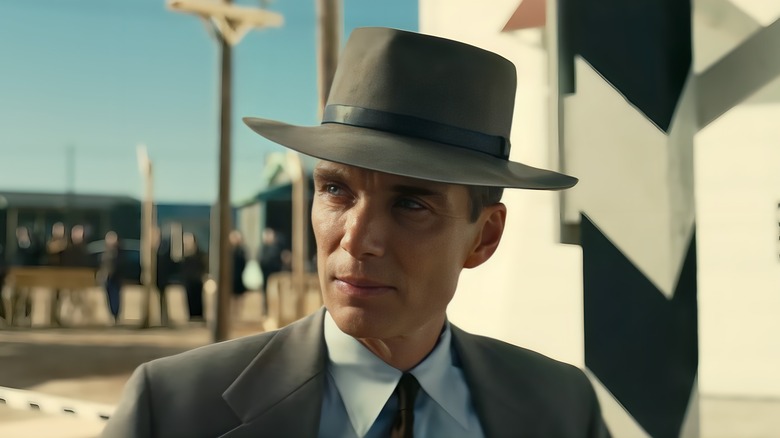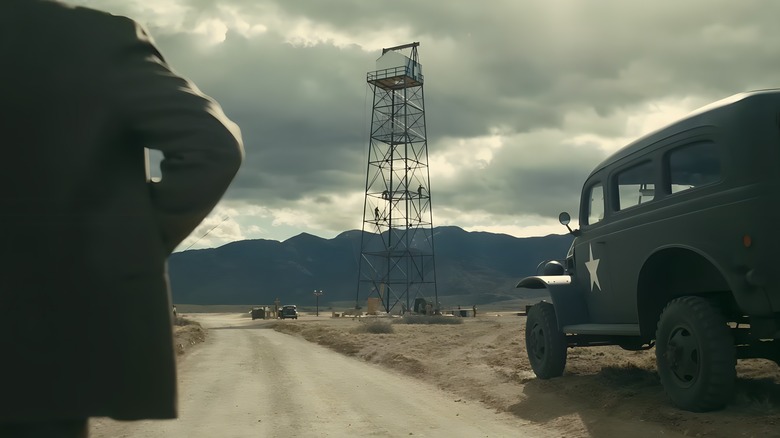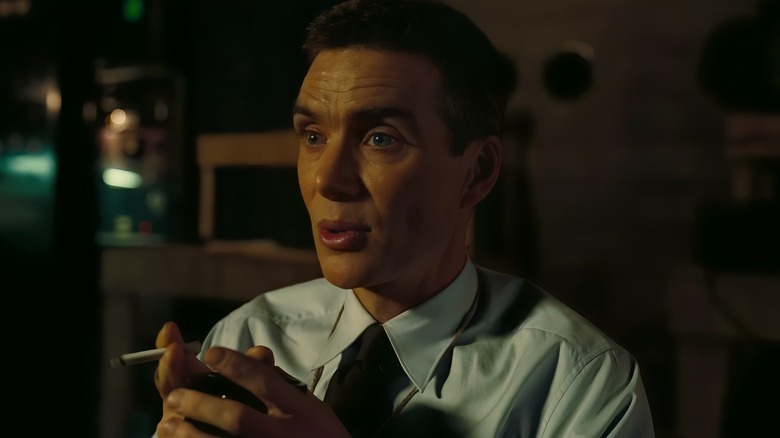Oppenheimer: How Christopher Nolan's Dark Knight Rises Fueled The Film's Trinity Test
For those unfamiliar with the entire history of J. Robert Oppenheimer's history with the atomic bomb, you may not know about the moment referred to as the "Trinity test." On July 16, 1945, Oppenheimer tested out the world's first atomic bomb in New Mexico in the middle of an isolated desert, and according to the book "American Prometheus: The Triumph and Tragedy of J. Robert Oppenheimer" by Kai Bird and Martin J. Sherwin, the people who bore witness to it thought the world ended at the very moment the bomb exploded.
This is at once a terrifying and wholly cinematic moment, which is why it's a given that Christopher Nolan had to adapt the Trinity test for his sprawling summer epic "Oppenheimer." In a roundtable discussion with Entertainment Weekly alongside the film's stars — including Robert Downey Jr., Matt Damon, Emily Blunt, and Cillian Murphy — Nolan said, "We always knew that the Trinity test would have to be a showstopper. It's the fulcrum that the whole story turns on."
In creating the on-screen depiction of the Trinity test, Nolan knew one thing: after featuring CGI explosions in his 2012 film "The Dark Knight Rises," he was sure that a digital version of the Trinity test just wouldn't read. As he told EW, he asked his visual effects supervisor from "Tenet," Andrew Jackson, for help. "When I finished the script, one of the first people I showed the script to was my visual effects supervisor," Nolan recalled. "I wanted to take CG off the table and see if he could come up with real-world methodologies for producing the effect of the first atomic blast."
A real replica of the atomic bomb was built for Oppenheimer
"I wanted to try and look into Oppenheimer's mind [with] symbolic imagery and visualizations of the quantum world," Nolan continued. "Andrew Jackson understands the computer world but he also understands the analog world. He's wonderful with that. And so he spent months and months and months doing all these experiments and figuring out all these methods, some very, very small and microscopic, some of them absolutely colossal."
Jackson, alongside special effects supervisor Scott Fisher and production designer Ruth De Jong, oversaw the creation of an actual recreation of the atomic bomb, which thrilled Nolan despite that he directly told his crew they didn't need to go quite that far. "When we were trying to make our budget work, it was like, well, what do you need to see of the gadget itself?" Nolan revealed. (In the movie, as EW points out, the bomb is referred to as a "gadget.")
"I was like, well, we only see it in these shots and those shots," Nolan went on. "They ignored that completely, and they built the entire thing in exacting detail, so that we were then free to shoot the entire process, the shrink wrapping on it as it comes up in the truck that gets cut off, the way that the different modules are inserted in and wired up. We were able to build the tension up to the detonation by showing that process that they went through."
Christopher Nolan made sure his cast had a truly authentic experience on Oppenheimer
Not only did Nolan's crew actually craft a replica of the atomic bomb, Nolan was able to utilize replicas of the bunkers that Oppenheimer and his colleagues were stationed in before the Trinity test and during its aftermath. "Ruth De Yong [built] the bunkers as they would have been so we could shoot in the middle of the night, in the desert, in the real places, and get [the actors] there to really experience some measure of what that tension would have been like that the weeks building up [to] that crazy night sort of building up," Nolan said.
Nolan is nothing if not a stickler for authenticity — he famously shot the rotating hallway scene in "Inception" using mostly practical effects — and it seems like the elements all came together to provide the perfect filming environment for "Oppenheimer," from the weather to the incredible efforts of his production team. "The thing is, we're always prepared to try and use what nature gives us to give us a real texture, and in the case of the New Mexico desert it just paid such dividends," Nolan concluded. "All of it just informs the whole drama of the piece, and the build-up to Trinity is the key — it's really all about the tension leading up to it, and the process that they went through."
"Oppenheimer" hits theaters on July 21, 2023.


